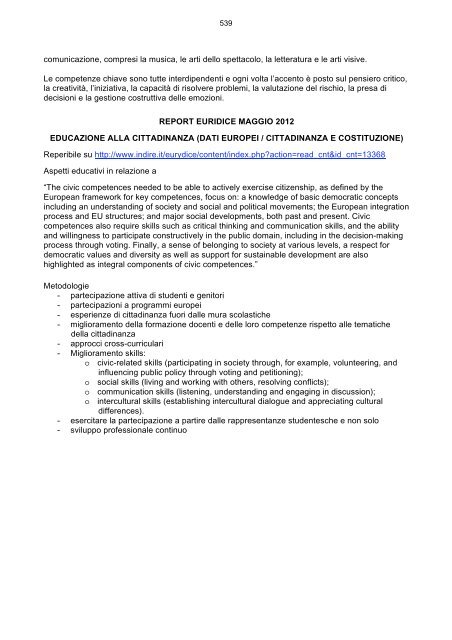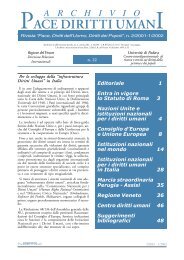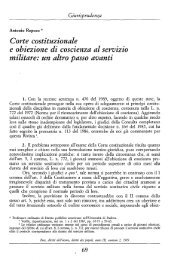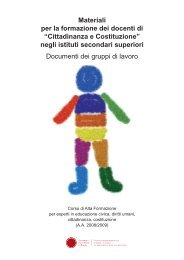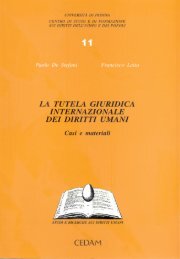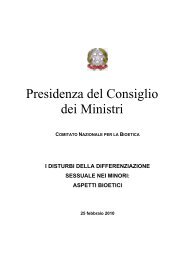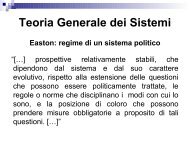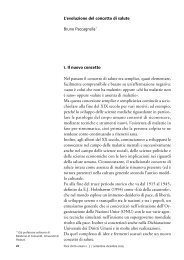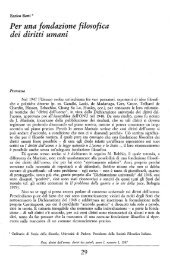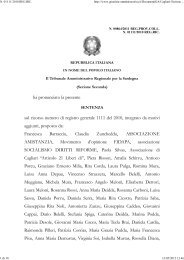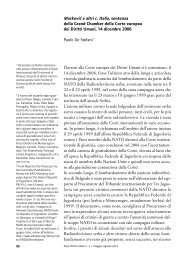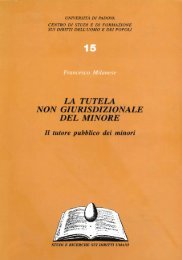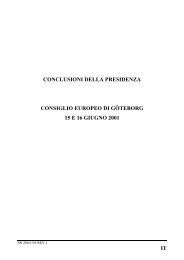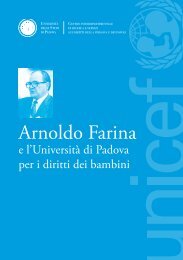- Page 1 and 2:
Cattedra UNESCO Diritti Umani, Demo
- Page 3 and 4:
Indice Presentazione 5 Insegnanti c
- Page 5 and 6:
Presentazione Il percorso di formaz
- Page 7 and 8:
7 Insegnanti che hanno frequentato
- Page 9 and 10:
Quarta sessione Identità e senso d
- Page 11 and 12:
Terza sessione (15.30 - 18.30) Grup
- Page 13 and 14:
13 Citizenship and Constitution APP
- Page 15 and 16:
15 Citizenship and Constitution 2.
- Page 17 and 18:
17 Citizenship and Constitution 5.
- Page 19 and 20:
RISULTATI ATTESI ← La vision comp
- Page 21 and 22:
21 Citizenship and Constitution 1.
- Page 23 and 24:
PER IL BIENNIO ↓ STRUMENTI DIDATT
- Page 25 and 26:
25 Citizenship and Constitution Con
- Page 27 and 28:
per noi la ricchezza è più motivo
- Page 29 and 30:
TRIENNIO: ETA’ MODERNA RICONOSCIM
- Page 31 and 32:
31 Citizenship and Constitution VI.
- Page 33 and 34:
33 Citizenship and Constitution 1.
- Page 35 and 36:
A. Unione Europea come spazio di li
- Page 37 and 38:
− Comitato sui diritti dell’inf
- Page 39 and 40:
39 si trova oggi, nei paesi industr
- Page 41 and 42:
4 - Individuare mappe concettuali /
- Page 43 and 44:
43 5 -Individuare itinerari di citt
- Page 45 and 46:
A PERCORSO PER IL BIENNIO DELLA SCU
- Page 47 and 48:
Roma, evidenziando le categorie di
- Page 49 and 50:
Per la classe quarta: Il lavoro e l
- Page 51 and 52:
uno Citizenship and Constitution AP
- Page 53 and 54:
dell’eguaglianza dei diritti e de
- Page 55 and 56:
Articolo 1 a. Il Consiglio d’Euro
- Page 57 and 58:
art. 1 Principi fondamentali 1. Il
- Page 59 and 60:
59 accompagnano un’epoca di cambi
- Page 61 and 62:
dell’Europa, agli organismi inter
- Page 63 and 64:
63 per l'alfabetizzazione universal
- Page 65 and 66:
65 All’Art 2 ( in cui si indica i
- Page 67 and 68:
67 riconoscere il diritto di autode
- Page 69 and 70:
69 4 - Individuare mappe concettual
- Page 71 and 72:
disgregata , perdendo il ruolo di
- Page 73 and 74:
La proposta di un itinerario didatt
- Page 75 and 76:
MODULO II : IL MONDO SIAMO NOI - le
- Page 77 and 78:
77 interculturale, e dovrebbero app
- Page 79 and 80:
Acquisizione di competenze relazion
- Page 81 and 82:
Citizenship and Constitution APPREN
- Page 83 and 84:
Articolo 3. 3. Gli Stati hanno il d
- Page 85 and 86:
85 a) di conoscere, ricercare, otte
- Page 87 and 88:
87 Normativa nazionale - Costituzio
- Page 89 and 90:
diversità. A tal fine promuove azi
- Page 91 and 92:
V. Aspetti particolari dell'apprend
- Page 93 and 94:
vocazione internazionale, questi sf
- Page 95 and 96:
95 Indicazioni a livello internazio
- Page 97 and 98:
Definizione: Consapevolezza dell’
- Page 99 and 100:
- Raccomandazione CM/Rec(2010) del
- Page 101 and 102:
101 10. I regolamenti delle singole
- Page 103 and 104:
103 L’insegnamento di Cittadinanz
- Page 105 and 106:
4 - Individuare mappe concettuali /
- Page 107 and 108:
Conoscenze specifiche Competenze tr
- Page 109 and 110:
109 2 Collocare l’argomento nella
- Page 111 and 112:
111 L’educazione interculturale,
- Page 113 and 114:
113 5 -Individuare itinerari di cit
- Page 115 and 116:
2 Collocare l’argomento nella tip
- Page 117 and 118:
• Protocollo sullo statuto della
- Page 119 and 120:
119 indicazioni metodologiche carat
- Page 121 and 122:
121 La Carta Comunitaria dei diritt
- Page 123 and 124:
123 propagazione di onde sempre pi
- Page 125 and 126:
125 5 -Individuare itinerari di cit
- Page 127 and 128:
127 - Visione geo-storica dei Paesi
- Page 129 and 130:
129 senso della sua dignità. L’e
- Page 131 and 132:
131 cultura economica e sociale in
- Page 133 and 134:
Citizenship and Constitution APPREN
- Page 135 and 136:
Protocollo riguardante il traffico
- Page 137 and 138:
137 La metodologia utilizzata sarà
- Page 139 and 140:
4 - Individuare mappe concettuali /
- Page 141 and 142:
Diritti Umani e diritti fondamental
- Page 143 and 144:
143 Educare a scuola con l paradigm
- Page 145 and 146:
2 Collocare l’argomento nella tip
- Page 147 and 148:
alimentazione e ad accedere all’a
- Page 149 and 150:
· alla possibilità di riflettere,
- Page 151 and 152:
consentano a ciascuno di riqualific
- Page 153 and 154:
• alla Dichiarazione delle Nazion
- Page 155 and 156:
[…] • alla Dichiarazione delle
- Page 157 and 158:
3. a.1. Ricerca di materiale didatt
- Page 159 and 160:
159 Situazione problematica/argomen
- Page 161 and 162:
Obiettivo formativo interagire con
- Page 163 and 164:
163 • Scuola come: cantiere di me
- Page 165 and 166:
• Tutela del patrimonio storico d
- Page 167 and 168:
- La compenetrazione dell’ordinam
- Page 169 and 170:
− Dichiarazione finale adottata d
- Page 171 and 172:
171 e. Le pratiche e le attività d
- Page 173 and 174:
173 · Raccomandazione del Parlamen
- Page 175 and 176:
L'educazione che a questo riguardo,
- Page 177 and 178:
177 i processi e le decisioni in gr
- Page 179 and 180:
- Comprendere di essere vicini a ch
- Page 181 and 182:
FORUM CONDIVISIONE DI PENSIERI E OP
- Page 183 and 184:
183 locale sia a livello internazio
- Page 185 and 186:
Citizenship and Constitution APPREN
- Page 187 and 188:
2 Collocare l’argomento nella tip
- Page 189 and 190:
) incoraggiano l’organizzazione d
- Page 191 and 192:
Art. 34 La scuola è aperta a tutti
- Page 193 and 194:
i. le zone umide incluse nell'elenc
- Page 195 and 196:
Gli stati membri dell'Unione europe
- Page 197 and 198:
Il Fondo per l’ambiente italiano
- Page 199 and 200:
2. L'educazione e la formazione ai
- Page 201 and 202:
Art. 4/5 Conoscenza abilità compet
- Page 203 and 204:
progetti, ed in tutte le aree, inol
- Page 205 and 206:
icostruire Il senso di identità L
- Page 207 and 208:
5 -Individuare itinerari di cittadi
- Page 209 and 210:
SCHEDA DI PRESENTAZIONE / INTRODUZI
- Page 211 and 212:
STESURA DEL COPIONE Molto tempo si
- Page 213 and 214:
dell’OCSE (Organizzazione per la
- Page 215 and 216:
Scuola 2.0 http://www.avolta.pg.it/
- Page 217 and 218:
Legge 104 del 1992 Piano regionale
- Page 219 and 220:
● Clonazione umana (B5-0710, 0751
- Page 221 and 222:
limitarsi a trasmettere una serie d
- Page 223 and 224:
− 1. Ognuno ha il diritto a conos
- Page 225 and 226:
●19 ottobre 2005, Unesco la Dichi
- Page 227 and 228:
Dignità umana Identità e apparten
- Page 229 and 230:
Conoscenze specifiche Competenze tr
- Page 231 and 232:
231 scuola e nelle relazioni tra sc
- Page 233 and 234:
233 delle responsabilità storiche,
- Page 235 and 236:
• a.s. 2011-2012 Approvazione Com
- Page 237 and 238:
) I diritti umani nel diritto e nel
- Page 239 and 240:
− Raccomandazione del Consiglio d
- Page 241 and 242:
cittadino/straniero e riconosce l
- Page 243 and 244:
Francesco Paolo Casavola, I diritti
- Page 245 and 246:
anche mediante l’apprendimento de
- Page 247 and 248:
247 l’insegnamento e l’azione i
- Page 249 and 250:
manifestazione del pensiero Cittadi
- Page 251 and 252:
Citizenship and Constitutionà APPR
- Page 253 and 254:
253 NORMATIVA DI CARATTERE INTERNAZ
- Page 255 and 256:
L'Assemblea, ricordando la sua racc
- Page 257 and 258:
Associazione Amici Alzheimer Onlus
- Page 259 and 260:
259 2 Collocare l’argomento nella
- Page 261 and 262:
261 valorizzazione di ciascun allie
- Page 263 and 264:
263 criteri qualitativi di rapprese
- Page 265 and 266:
Dimensione teleologica: storici del
- Page 267 and 268:
Rapporto tra diritto italiano e int
- Page 269 and 270:
• Crisi strutturale della statual
- Page 271 and 272:
Classe III Conoscenze disciplinari
- Page 273 and 274:
273 c) Garantiscono a tutti l'acces
- Page 275 and 276:
275 percorsi educativi e didattici.
- Page 277 and 278:
dell’Assemblea dell’ONU 9.12.19
- Page 279 and 280:
Citizenship and Constitution APPREN
- Page 281 and 282:
281 Il nucleo tematico individuato
- Page 283 and 284:
283 a) lo sviluppo olistico del pie
- Page 285 and 286:
285 Conosnocifiche Competenze trasv
- Page 287 and 288:
287 - Magna Charta libertatum - Cos
- Page 289 and 290:
289 2. Collocare l’argomento nell
- Page 291 and 292:
I percorsi educativi che sono final
- Page 293 and 294:
4 - Individuare mappe concettuali /
- Page 295 and 296:
• Linee essenziali dello sviluppo
- Page 297 and 298:
Citizenship and Constitution APPREN
- Page 299 and 300:
ART. 23 Diritto al lavoro come riso
- Page 301 and 302:
301 migliori condizioni di salute f
- Page 303 and 304:
303 TITOLO II LIBERTÀ ART. 6 Dirit
- Page 305 and 306:
EUROPA 2020 Una strategia per una c
- Page 307 and 308:
-DPR 21 GENNAIO 2011: Piano biennal
- Page 309 and 310:
1. E' istituito l'archivio Storico
- Page 311 and 312:
311 attiva degli studenti al fine d
- Page 313 and 314:
313 livelli, tanto quanto i valori,
- Page 315 and 316:
315 o DICHIARAZIONE DELLE NAZIONI U
- Page 317 and 318:
Appendice o COMMENTO GENERALE N. 1
- Page 319 and 320:
319 L’aspirazione di un itinerari
- Page 321 and 322:
-Conoscere alcune leggi fondamental
- Page 323 and 324:
-Sensibilizzare ad una cultura di i
- Page 325 and 326:
-Riconoscere nelle molteplici risor
- Page 327 and 328:
Obiettivo Formativo trasversale -Sc
- Page 329 and 330:
329 Bibliografia G. Ameglio, C. Caf
- Page 331 and 332:
Citizenship and Constitution APPREN
- Page 333 and 334:
333 Dichiarazione di Vienna e progr
- Page 335 and 336:
Costituzione della Repubblica Itali
- Page 337 and 338:
337 e dello stato di diritto. “Ed
- Page 339 and 340:
5. La rappresentanza degli interess
- Page 341 and 342:
Citizenship and Constitution APPREN
- Page 343 and 344:
− Dichiarazione delle Nazioni Uni
- Page 345 and 346:
In relazione ai documenti: 345 •
- Page 347 and 348:
347 5 -Individuare itinerari di cit
- Page 349 and 350:
349 “vite di scarto” (2004) ins
- Page 351 and 352:
351 Decisione del Consiglio 2000/3
- Page 353 and 354:
353 − Carta Comunitaria dei dirit
- Page 355 and 356:
Conoscenze specifiche Competenze tr
- Page 357 and 358:
Citizenship and Constitution APPREN
- Page 359 and 360:
359 vita o che esponga a trattament
- Page 361 and 362:
361 Capitolo A: “L’educazione g
- Page 363 and 364:
Conoscenze specifiche Competenze tr
- Page 365 and 366:
365 IN RELAZIONE ALLA TEMATICA AFFR
- Page 367 and 368:
libertà e diritti civili: artt 13
- Page 369 and 370:
programma-_2007.pdf Sperimentazione
- Page 371 and 372:
371 1. la realizzazione e la cresci
- Page 373 and 374:
373 4 - Individuare mappe concettua
- Page 375 and 376:
375 Link: http://www.sicurascuola.c
- Page 377 and 378:
) Cittadinanza europea come cittadi
- Page 379 and 380:
Costituzione Francese del 1791 Dich
- Page 381 and 382:
381 L'Atto concedeva libertà di cu
- Page 383 and 384:
383 Le confessioni religiose divers
- Page 385 and 386:
costretto a ricevere un'educazione
- Page 387 and 388:
Diversità culturale, religiosa e l
- Page 389 and 390:
Comma 2. La Puglia, per la storia p
- Page 391 and 392:
391 Ricercare indicazioni operative
- Page 393 and 394:
393 valori e dei loro modelli di vi
- Page 395 and 396:
collettività). Chiarire i principa
- Page 397 and 398:
397 5 -Individuare itinerari di cit
- Page 399 and 400:
399 Laboratorio civico-motorio “P
- Page 401 and 402:
Spina dorsale: Normativa internazio
- Page 403 and 404:
Citizenship and Constitution APPREN
- Page 405 and 406:
ESSERE TRASCENDENTE coscienza relig
- Page 407 and 408:
FASE 2 - con gli altri…, artt. 2-
- Page 409 and 410:
FASE 4 - Oltre me un dialogo senza
- Page 411 and 412:
FASE 2 - Persona e relazione; artt.
- Page 413 and 414:
Citizenship and Constitution APPREN
- Page 415 and 416:
− Competenze fondamentali per l
- Page 417 and 418:
417 • Laboratori sulla lavorazion
- Page 419 and 420:
Normativa internazionale - Dichiara
- Page 421 and 422:
Sistemi regionali I ‐ Convenzioni
- Page 423 and 424:
4 ‐ Individuare mappe concettuali
- Page 425 and 426:
Classe 1^ Individuazione nuclei tem
- Page 427 and 428:
5 ‐Individuare itinerari di citta
- Page 429 and 430:
429 - I valori fondanti o “costit
- Page 431 and 432:
431 Saranno quindi privilegiati “
- Page 433 and 434:
433 Conoscenze specifiche Competenz
- Page 435 and 436:
435 Gruppo 5: La politica dell’UE
- Page 437 and 438:
In relazione alla tematica affronta
- Page 439 and 440:
) immigrazione; c) rapporti tra la
- Page 441 and 442:
per il loro benessere; b) riconosce
- Page 443 and 444:
− Dichiarazione delle Nazioni Uni
- Page 445 and 446:
445 Conoscenze Conoscenze sul proce
- Page 447 and 448:
447 − Raccomandazione dell’Unes
- Page 449 and 450:
4 - Individuare mappe concettuali /
- Page 451 and 452:
5 -Individuare itinerari di cittadi
- Page 453 and 454:
Citizenship and Constitution APPREN
- Page 455 and 456:
informazione e coscientizzazione. 3
- Page 457 and 458:
4 - Individuare mappe concettuali /
- Page 459 and 460:
• La Costituzione della Repubblic
- Page 461 and 462:
Citizenship and Constitution APPREN
- Page 463 and 464:
463 che ciascuno di noi ha, nello s
- Page 465 and 466:
465 Informazione e partecipazione s
- Page 467 and 468:
organismi internazionali, enti di g
- Page 469 and 470:
469 L’approccio olistico è fonda
- Page 471 and 472:
471 Raccomandazione dell’Unesco s
- Page 473 and 474:
- Individuare mappe concettuali / o
- Page 475 and 476:
475 - sociale - in quanto il mondo
- Page 477 and 478:
Citizenship and Constitution APPREN
- Page 479 and 480:
- Carta dei valori, della cittadina
- Page 481 and 482:
Si ricorda, inoltre, la “Raccoman
- Page 483 and 484:
483 • Agire in modo autonomo e re
- Page 485 and 486:
3.la virtù del governare (governan
- Page 487 and 488: NUCLEI TEMATICI, OBIETTIVI DI APPRE
- Page 489 and 490: Conoscenza di sé intesa come: •
- Page 491 and 492: 491 di avere ciascuno un patrimonio
- Page 493 and 494: Internazionali Scuola Secondaria di
- Page 495 and 496: INDICATORI DI OSSERVAZIONE, MONITOR
- Page 497 and 498: 3) Promozione delle competenze nece
- Page 499 and 500: introduzioni documenti base • Ind
- Page 501 and 502: La scuola può, deve, vuole essere
- Page 503 and 504: consapevole a valori condivisi e di
- Page 505 and 506: 505 2. L'educazione e la formazione
- Page 507 and 508: Metodologia della Narrazione e dell
- Page 509 and 510: Il bisogno di partenza è stato que
- Page 511 and 512: 511 2 Collocare l’argomento nella
- Page 513 and 514: LEGGE REGIONALE 17 ottobre 2007, n.
- Page 515 and 516: 4 - Individuare mappe concettuali L
- Page 517 and 518: POSSIBILI SVILUPPI 1.DIRITTI NEGATI
- Page 519 and 520: Citizenship and Constitution APPREN
- Page 521 and 522: 521 − Linee guida per l’educazi
- Page 523 and 524: Mappa concettuale o obiettivi didat
- Page 525 and 526: Citizenship and Constitution APPREN
- Page 527 and 528: 527 1. Ogni persona ha il diritto d
- Page 529 and 530: 529 3. In particolare, la Provincia
- Page 531 and 532: ! Report Euridice maggio 2012 Educa
- Page 533 and 534: sostegno di nuove prove o argomenta
- Page 535 and 536: art. 6 comma 1,2 Tecnologie, arte..
- Page 537: I cambiamenti di tipo organizzativo
- Page 541 and 542: specifico indirizzo di studio - Con
- Page 543 and 544: 543
- Page 545 and 546: conoscenza delle leggi che sancisco
- Page 547 and 548: introdotte dalla legge costituziona
- Page 549 and 550: 549 Raccomandazione del Parlamento
- Page 551 and 552: 551 pluralismo e diversità possono
- Page 553 and 554: Conoscenze specifiche Competenze tr
- Page 555 and 556: Citizenship and Constitution APPREN
- Page 557 and 558: 557
- Page 559 and 560: 559
- Page 561 and 562: 561
- Page 563 and 564: 563
- Page 565 and 566: 565
- Page 567 and 568: 567
- Page 569 and 570: 569
- Page 571 and 572: 571
- Page 573 and 574: 573
- Page 575 and 576: 575
- Page 577 and 578: 577
- Page 579 and 580: 579
- Page 581 and 582: 581
- Page 583 and 584: 583
- Page 585 and 586: 585
- Page 587 and 588: 587
- Page 589 and 590:
589
- Page 591 and 592:
591
- Page 593 and 594:
593
- Page 595 and 596:
595
- Page 597 and 598:
597
- Page 599 and 600:
599
- Page 601 and 602:
4 - Individuare mappe concettuali /
- Page 603 and 604:
603
- Page 605 and 606:
5 -Individuare itinerari di cittadi
- Page 607 and 608:
607
- Page 609 and 610:
609
- Page 611 and 612:
611
- Page 613 and 614:
613
- Page 615 and 616:
615
- Page 617 and 618:
617
- Page 619 and 620:
619
- Page 621 and 622:
621


